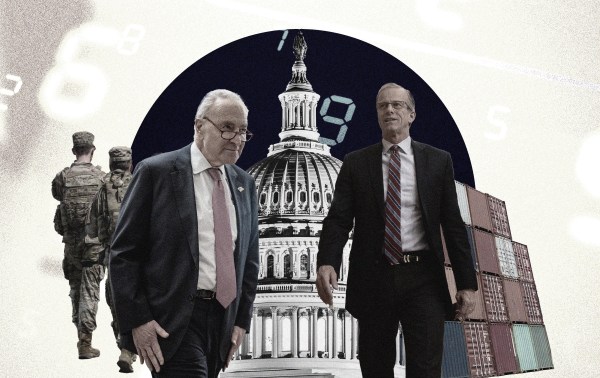Happy Wednesday! And happy National Step In A Puddle And Splash Your Friends Day to all who are celebrating. Keep your head on a swivel.
Quick Hits: Today’s Top Stories
- The House voted 365-65 on Tuesday to establish the Select Committee on the Strategic Competition Between the United States and the Chinese Communist Party, and 221-211 to establish the Subcommittee on the Weaponization of the Federal Government. The former will be chaired by GOP Rep. Mike Gallagher of Wisconsin, the latter by GOP Rep. Jim Jordan of Ohio. Rep. Pete Aguilar, Democratic caucus chairman, told reporters yesterday House Democrats plan to participate in all select committee investigations on the docket for Republicans.
- Russian mercenary forces in Ukraine claimed they captured the small Donbas town of Soledar en route to the strategic city of Bakhmut on Tuesday, seeming to confirm an assessment by British intelligence officials outlining recent Russian progress in the east. The development represents the first major success for the Russian military in months, but the battle for Bakhmut will be a slog: Ukrainian forces have been defending the city for months, remain in control of supply routes, and have additional military aid from the United States and Europe en route.
- The Pentagon announced Tuesday between 90 and 100 Ukrainian soldiers will travel to the United States next week for a months-long training program at Fort Sill in Oklahoma on how to operate, maintain, and sustain the Patriot missile system the U.S. announced would be included in a recent aid package.
- Weeks after congressional Republicans forced his hand, Defense Secretary Lloyd Austin issued a memo Tuesday announcing the Pentagon was formally dropping its COVID-19 vaccine mandate that had been in place since August 2021 and led to the discharge of more than 8,000 troops. The Pentagon will continue to promote vaccination to “enhance operational readiness,” Austin’s memo reads, and it will allow commanders to consider troops’ immunization status in making deployment and assignment decisions. Those discharged for refusing the shot will not automatically be reinstated, but Austin said they can petition their military department’s Dispatch Review Boards to “individually request a correction to their personnel records.”
- In a speech delivered in Sweden on Tuesday, Federal Reserve Chairman Jerome Powell pushed back on some of his progressive critics who argue the central bank has not done enough to combat climate change. “It is essential that we stick to our statutory goals and authorities, and that we resist the temptation to broaden our scope to address other important social issues of the day,” he said. “Without explicit congressional legislation, it would be inappropriate for us to use our monetary policy or supervisory tools to promote a greener economy or to achieve other climate-based goals. We are not, and will not be, a ‘climate policymaker.’”
- Democratic Rep. Katie Porter of California announced Tuesday she is running for the U.S. Senate seat currently occupied by Sen. Dianne Feinstein. Feinstein, 89, is expected to announce she won’t seek reelection in 2024 but hasn’t yet. By jumping in now, the progressive Porter gets an early leg up on what is expected to be a crowded primary field: Reps. Adam Schiff, Barbara Lee, and Ro Khanna are all reportedly weighing bids of their own. A former aide recently accused Porter of mistreating staff, a charge the congresswoman disputes.
Classified Documents for Me but not for Thee

Elected officials tend to excel at the pivot, as an action totally excusable—nay, even noble!—when taken by my team is suddenly destructive, despicable, and disqualifying when taken by yours. Monday’s news that classified documents had been found in a private office of President Joe Biden offered a great opportunity for such partisan pirouettes: Former President Donald Trump has a fresh target across the aisle for finger-pointing as he downplays his own mishandling of presidential and classified documents.
After leaving the Obama White House, Biden did what any self respecting out-of-office politician would do: Set up a think tank. Though an alum of Syracuse and the University of Delaware, Biden became an honorary professor at the University of Pennsylvania and helped set up the Penn Biden Center for Diplomacy and Global Engagement. He quickly returned to the campaign trail but kept a think tank office near the Capitol. On November 2, while packing up boxes to close down the office one of Biden’s personal attorneys reportedly found—in a locked closet, according to Richard Sauber, special counsel to the president—a manila folder labeled “personal.” The lawyer opened it—then closed it again, an anonymous source familiar told CNN. Biden’s team swiftly informed the National Archives and Records Administration (NARA) it had found classified documents.
Asked about the files while in Mexico Tuesday, Biden says he didn’t know about them until November. “I was briefed about this discovery and surprised to learn that there are any government records that were taken there to that office,” he said, adding his lawyers recommended he not ask about their contents. “I don’t know what’s in the documents.” The White House hasn’t fully explained why it took two months and a CBS News report to make the document discovery public. Ian Sams, a senior adviser to the White House Counsel’s Office, told the Washington Post the Department of Justice’s review of the situation means the White House is “limited in what we can say at this time.”
The office reportedly contained about 10 classified documents—CNN reported some were labeled “sensitive compartmented information” (SCI) or top secret—in boxes that also held unclassified papers, which under the Presidential Records Act should have been turned in to NARA when Biden left office in 2017. Dated from 2013 to 2016, the files reportedly included “intelligence memos and briefing materials that covered topics including Ukraine, Iran and the United Kingdom.” According to Sauber, NARA took possession of the files the morning after they were found.
This news, predictably, has Team Trump salivating and lawmakers demanding answers. “When is the FBI going to raid the many homes of Joe Biden, perhaps even the White House?” the former president asked on Truth Social. GOP Rep. James Comer of Kentucky argued the two cases prove there’s a “two-tier” justice system, and that system is stacked against Trump. As chair of the House Oversight Committee which oversees NARA, Comer vowed to look into its handling of the matter. Republican Ohio Rep. Mike Turner—House Intelligence Committee chair—sent a letter to Director of National Intelligence Avril Haines asking her to conduct an “immediate review and damage assessment.”
We’re still in the early days of this story, but based on what we know so far, Biden and Trump behaved very differently upon discovery of improperly retained records. The Biden office documents apparently sat unsecured for years after he left office, while NARA quickly began pursuing the materials Trump or his aides brought to Mar-a-Lago. While Sauber claims the president’s staff turned over the records within 24 hours of finding them, the FBI had to search Trump’s Mar-a-Lago resort for missing documents even after he’d already returned 15 boxes. Officials carried off 33 boxes from the search—including many labeled classified, some pertaining to nuclear secrets—even though Trump’s legal team had previously provided a sworn certification that the former president had returned all presidential records.
Trump’s misconduct appears to be an order of magnitude greater. Even so, improper handling of classified information poses serious dangers to national security, as intelligence documents can reveal both sensitive information and how we got it. “There are plenty of processes in place to ensure that this doesn’t happen,” Klon Kitchen, a senior fellow and national security expert at the American Enterprise Institute (and author of The Current), told us. “The fact that it has happened means either that those processes were deliberately ignored or not thoroughly followed. Either explanation is unacceptable, and we cannot treat classified information—especially SCI classified information—with this type of recklessness.”
But don’t take Klon’s word for it: POTUS himself has explained the risks. “What data was in there that may compromise sources and methods?” Biden said of Trump’s unsecured documents. “How one—anyone could be that irresponsible?”
As for the documents discovered in Biden’s private office, it’s still unclear exactly what was in them, how they got there, and who might have gained access to them while unsecured. Sen. Mark Warner, Democratic chairman of the Senate Intelligence Committee, called for officials to brief lawmakers on both cases. “Our system of classification exists in order to protect our most important national security secrets, and we expect to be briefed on what happened both at Mar-a-Lago and at the Biden office as part of our constitutional oversight obligations,” he said. “From what we know so far, the latter is about finding documents with markings, and turning them over, which is certainly different from a months-long effort to retain material actively being sought by the government. But again, that’s why we need to be briefed.”
Attorney General Merrick Garland reportedly had U.S. Attorney for the Northern District of Illinois John Lausch—one of two remaining Trump-appointees, the other investigating Hunter Biden in Delaware—review the matter and brief Garland, who is now weighing next steps, a law enforcement source told CNN.
Trump’s case is also under review by special counsel Jack Smith. The former president’s delayed compliance and resistance could open him to charges of obstruction or violation of the Espionage Act’s prohibition on knowingly withholding classified documents that have been requested. “What the prosecutor is really looking at is: Did the president intentionally mishandle these documents?” Jamil Jaffer, director of the National Security Law & Policy Program at George Mason University’s Antonin Scalia Law School, told The Dispatch. By that measure, Sauber’s account of the Biden team’s actions—if it proves true—suggests quick compliance that might not be legally actionable.
Even if the DOJ finds sufficient evidence to pursue charges against Trump, the Biden blunder may have made a prosecution politically untenable—though Jaffer noted it was never going to be smooth sailing. “It’s always hard to prosecute a former president,” he argued. “Does this change that fundamentally? I don’t think so.”
Regardless, Kitchen argued, the fact that we’re not sure whether mishandling classified information will go unpunished is its own problem, apart from the politics. “The political problem is now a national security problem,” he said. “It hurts the interests of the United States when we cannot hold people accountable [for] reckless mishandling of classified material.”
Worth Your Time
- For City Journal, Charles Fain Lehman tells the story of the late Herman Wrice, the Philadelphia activist who devoted his life to driving drugs out of his city’s poorest communities. “Wrice developed guerilla tactics against crack dealing that came to be known as the Wrice process,” Lehman writes. “Vigils were the hallmark. On any given night, Wrice and other ADC members would march to, and assemble in front of, a suspected drug house or crack corner. Wearing their signature white hard hats, they would occupy the block for hours, chanting, singing, and standing up to any dealers confronting them. The next morning, they would return to clean up trash, mow lawns, and beautify the area. And the next night, they’d be back at it. Shame was key. Dealers ‘can’t stand embarrassment, not that kind,’ Wrice said. The same principle justified the hanging of ‘wanted’ posters depicting known drug dealers. But Wrice’s vigils were also an effective example of a community reasserting its self-rule. Like any other form of antisocial behavior, drug dealing happens on the margins of society. Only when the majority retreats does such behavior take place out in the open. By cleaning up the area they were occupying, Wrice and his fellow marchers reclaimed their right to control their neighborhood, taking it back from the dealers.”
- In a thought-provoking essay, Michael Ignatieff ponders what it really means to “think for yourself” in a world where partisan tribalism rules and conventional wisdom can easily be scraped from the internet. “What we do is not processing. It is not computation. It is not data analysis. It is a distinctively, incorrigibly human activity that is a complex combination of conscious and unconscious, rational and intuitive, logical and emotional reflection. It is so complex that neither neurologists nor philosophers have found a way to model it, and the engineers of artificial intelligence are still struggling to replicate some of the simplest forms of pattern recognition that human cognition does so effortlessly. We must beware that in our attempt to make computers think like us we do not end up thinking like them.” Thinking, he continues, is also more than just “expressing yourself or having opinions. It is not about turning on the fountain of our personality. It is an exercise in finding reasons to persuade yourself and others that something is true, or at least plausibly true. Thinking has truth as its goal and its organizing discipline. Bullsh----rs, as Harry Frankfurt told us, are precisely those who do not think: they simply express what comes into their minds, without concerning themselves with whether what they are saying has any relation to reality. Every university is, or should be, properly worried that their classrooms are training generation after generation of accredited bullsh----rs.”
Presented Without Comment
Also Presented Without Comment
Also Also Presented Without Comment
Toeing the Company Line
- Would the midterms have turned out differently if Biden’s classified documents story was public in November? Will the administration’s new immigration plan have a material effect on the southern border? Which House GOP investigation will be the most interesting to follow? Sarah, Declan, Andrew, and Esther discussed all this and more on last night’s edition of Dispatch Live (🔒). Members who missed the conversation can catch a rerun—either video or audio-only—by clicking here.
- In this week’s edition of The Sweep (🔒), Sarah takes a look at what last week’s speakership fight will mean for future congressional campaigns. “If you think Congress is broken, change the incentives for what it means to be a member of Congress. Because that will change who runs in the first place,” she writes. “Eventually, it’ll change who wins, too.”
- For more on House Republicans’ new select committees, be sure to check out yesterday’s Uphill. “It may take several weeks for existing committees and the new ones to get off the ground,” Haley notes, as Republican leaders “delayed some organizing decisions until after the speakership race instead of addressing the question of chairmanships beforehand as is typical practice.”
- In Tuesday’s French Press (🔒), David takes stock of the war in Ukraine as we approach the one-year mark of Russia’s invasion. “We have the capacity to help Ukraine gather superior resources, to force Russia to spend too much, and to help Ukraine force an end to this war,” he writes. “The question is whether we have the intention or the will.”
- Welp, Trump’s probably not going to get indicted anymore. That’s Nick’s take, anyway. “Charging Trump and securing a conviction that would be respected by a meaningful share of Republicans was always going to be a high wall for special counsel Jack Smith and the DOJ to scale,” he writes in yesterday’s Boiling Frogs (🔒). “Unless Biden is also charged, the wall just got 10 feet higher.”
- On today’s episode of The Remnant, Jonah is joined by his AEI colleague Jim Pethokoukis for a discussion about the future of technology. Why haven’t we achieved some of the major advancements wonks were predicting in the ‘70s? Is last month’s nuclear fusion breakthrough the real deal? Where are the space elevators? And will highly intelligent, taxi-driving super-apes eventually overthrow mankind?
- On the site today, Jonah struggles for the words to describe recent Republican infighting and Foundation for Defense of Democracies’ Sinan Ciddi explains why Turkish President Recept Tayyip Erdoğan may soon be making nice with the Assad regime.
Let Us Know
Do you see a meaningful difference between the Trump and Biden classified material stories? If so, do you think the difference is meaningful enough that the Justice Department can feasibly indict one and not the other?






Please note that we at The Dispatch hold ourselves, our work, and our commenters to a higher standard than other places on the internet. We welcome comments that foster genuine debate or discussion—including comments critical of us or our work—but responses that include ad hominem attacks on fellow Dispatch members or are intended to stoke fear and anger may be moderated.
With your membership, you only have the ability to comment on The Morning Dispatch articles. Consider upgrading to join the conversation everywhere.